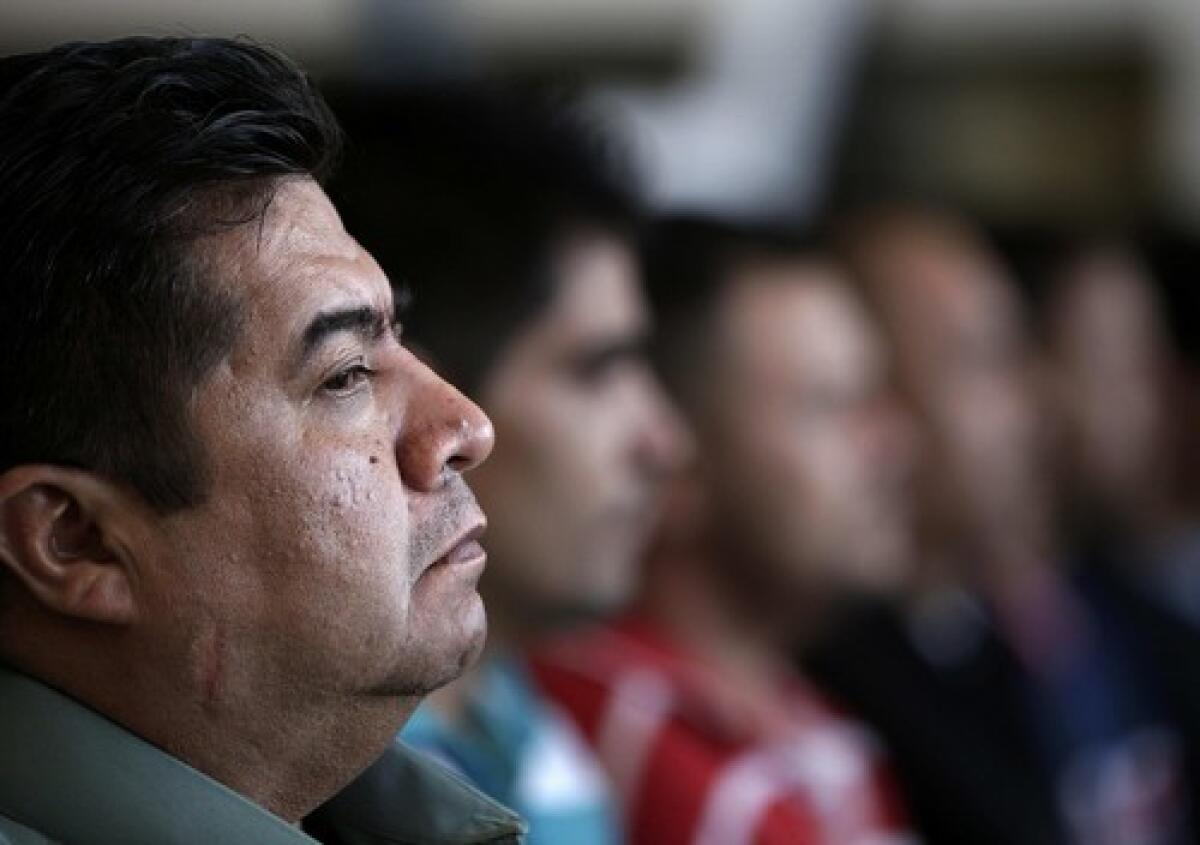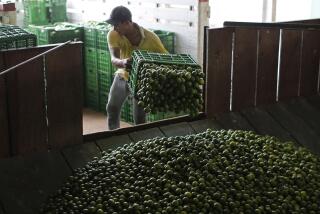10 mayors, other Mexico officials detained

Reporting from Mexico City — Mexican security forces swept into President Felipe Calderon’s home state of Michoacan on Tuesday and arrested a total of 27 mayors and other government officials, the largest operation to target politicians in Mexico’s bloody drug war.
The officials, including 10 mayors, are being investigated for alleged ties to drug traffickers and other organized crime syndicates that in effect control large sections of Michoacan, the federal attorney general’s office said.
Michoacan Gov. Leonel Godoy, in a brief, curt appearance before reporters, confirmed the arrests and said he had not been notified ahead of time.
Those detained include a key advisor to Godoy, a judge and several top regional public security officials, the attorney general’s office said. Most were taken to Mexico City for questioning after being rounded up during the morning from their homes, offices and city halls.
Julio Cesar Godoy, the governor’s brother and a congressional candidate, was questioned Tuesday by the army as part of the operation but was not arrested, the brother told a Michoacan newspaper.
Although Mexican authorities have frequently arrested corrupt security agents in drug-related cases, this is the first time they have gone after such a large number of elected officials. The sweep was significant because it represents an effort to hit the political cover that the traffickers enjoy, though it may not make much of a dent in the smuggling network, analysts said.
Michoacan is the base for a fast-growing, extremely violent drug-trafficking organization known as La Familia. The group, which in the last year has expanded its operations into three other Mexican states, is considered especially adept at infiltrating local governments by buying or scaring off mayors or members of city councils and police departments.
“Everything is so corrupt here, from top to bottom, the [federal] government had to show it was doing something,” Reginaldo Sandoval, president of the state branch of the small Labor Party, said in a telephone interview from Morelia, the capital of Michoacan.
At least 83 of Michoacan’s 113 municipalities are mixed up at some level with narcos, a Mexican intelligence source told The Times this month. The source, not authorized to talk to the press, spoke on condition of anonymity.
Dozens of mayors and other local officials have been killed or kidnapped as La Familia, with chilling, disciplined efficiency, has extended its reach. Calderon chose his native Michoacan to launch an army-led offensive against drug gangs shortly after taking office in December of 2006. The drug war-related death toll has since climbed by more than 11,000 people nationwide.
La Familia has been doing battle with the so-called Gulf cartel, which moved into Michoacan a few years ago in what was initially a strategic partnership. The arrangement ruptured last year, with the two groups struggling over control of land to produce drugs and over transport routes, including Michoacan’s valued Lazaro Cardenas seaport.
La Familia specializes in marijuana, methamphetamine and cocaine. In the last year it has set up shop in 20 to 30 cities and towns across the United States, a senior U.S. law enforcement official said Tuesday. Like many Mexican states where traffickers act with impunity, Michoacan suffers from rampant corruption, residents say. Several of the detained mayors are from the so-called Tierra Caliente (Hot Land) section of southwest Michoacan, a rugged, virtually lawless area dotted with meth labs. One person under arrest is the mayor of Uruapan, the city where traffickers in 2006 notoriously tossed five human heads onto a dance floor, an early signal of how grisly the drug war would become.
Six of the detained mayors are with the Institutional Revolutionary Party, or PRI, which ruled Mexico for more than 70 years; two each represent Godoy’s leftist Democratic Revolution Party and Calderon’s rightist National Action Party.
“We will be watching to be sure these detentions are processed correctly and . . . [then] we can conclude whether this is really an attack on crime or part of a partisan political campaign,” PRI Sen. Manlio Fabio Beltrones, who once had to fight off similar accusations, said in Mexico City. “I trust it is the former.”
Mexico votes in July in national elections to choose a new Chamber of Deputies, the 500-member lower house of Congress, and in six states for governors. One of Gov. Godoy’s top aides, Citlalli Fernandez, who is also the former public safety chief for Michoacan, and Mario Bautista, director of the state’s police academy, were among those arrested.
It was not clear whether more arrests would follow.
“It is important, but it won’t have an impact on the amount of drugs going to the United States,” said Alberto Islas, a Mexico City security analyst who has advised the Calderon government. “At the end of the day, the mayors and politicians are just another instrument in the cartels’ business.”
In another development, suspected drug hit men kidnapped and killed a Mexican journalist who covered crime for the Milenio television and newspaper chain. Eliseo Barron, snatched from his home Monday night by masked gunmen, was the second journalist in Durango state killed this month. His body was found Tuesday in an irrigation ditch with signs he had been tortured and shot, authorities said.
Durango is part of Mexico’s Golden Triangle, a region of trafficking where some people believe the country’s most wanted fugitive, Joaquin “El Chapo” Guzman, is hiding.
More to Read
Sign up for Essential California
The most important California stories and recommendations in your inbox every morning.
You may occasionally receive promotional content from the Los Angeles Times.











